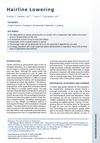 105 citations,
April 2004 in “Dermatologic Therapy”
105 citations,
April 2004 in “Dermatologic Therapy” The document concludes that proper diagnosis and a combination of medical, hair-care, and surgical treatments are important for managing alopecia in black women.
 55 citations,
July 2016 in “Dermatologic Therapy”
55 citations,
July 2016 in “Dermatologic Therapy” Multiple treatments work best for hair loss.
 23 citations,
October 2018 in “Expert Opinion on Drug Safety”
23 citations,
October 2018 in “Expert Opinion on Drug Safety” Consider benefits and risks of new alopecia treatments for safety.
 20 citations,
December 2016 in “American Journal of Clinical Dermatology”
20 citations,
December 2016 in “American Journal of Clinical Dermatology” Men prefer less invasive cosmetic procedures and need different treatment approaches than women.
 4 citations,
September 2019 in “Journal of Cosmetic Dermatology”
4 citations,
September 2019 in “Journal of Cosmetic Dermatology” FUE megasession effectively treats severe hair loss with natural-looking results in one operation.
 January 2012 in “Elsevier eBooks”
January 2012 in “Elsevier eBooks” Hair loss can cause emotional and social issues, and various treatments, including medication, surgery, and psychological support, are needed.
 January 2017 in “Springer eBooks”
January 2017 in “Springer eBooks” Scientists made working hair follicles using stem cells, helping future hair loss treatments.
 6 citations,
January 2023 in “npj regenerative medicine”
6 citations,
January 2023 in “npj regenerative medicine” Transplanting growing hair follicles into scars can help regenerate and improve scar tissue.

Surgeons should evaluate new technologies critically, offer a range of services including non-surgical options, and be aware of marketing influences to meet patient needs and maintain a successful practice.

Follicular unit grafting is a procedure used to treat hair loss, where small hair grafts are placed into the scalp, with future treatments likely to involve smaller incisions and cell-based therapies.
 22 citations,
January 2014 in “International Journal of Trichology”
22 citations,
January 2014 in “International Journal of Trichology” Hair restoration surgery can lead to swelling, infections, scarring, numbness, hiccups, and poor hair growth.
 2 citations,
March 2013 in “Hair transplant forum international”
2 citations,
March 2013 in “Hair transplant forum international” Research on "hair cloning" for hair loss shows potential for hair thickening but has not yet achieved new hair growth in humans.
 1 citations,
July 2023 in “Cureus”
1 citations,
July 2023 in “Cureus” Some treatments for hereditary hair loss are effective but vary in results and side effects; new therapies show promise but need more research.
2 citations,
January 2014 in “Journal of clinical and diagnostic research” Emerging therapies like stem cell and laser treatments show promise for hair regeneration.
 January 2024 in “Journal of cosmetic dermatology”
January 2024 in “Journal of cosmetic dermatology” Long-hair follicular unit excision improves hairline restoration results and patient satisfaction.
 May 2020 in “Hair transplant forum international”
May 2020 in “Hair transplant forum international” Younger people and those with existing acne are more likely to get folliculitis after hair restoration surgery, but it doesn't affect the overall good hair growth result.
 June 2023 in “Journal of Cosmetic Dermatology”
June 2023 in “Journal of Cosmetic Dermatology” The new follicular unit extraction treatment effectively treats severe hair loss in Asian men, giving natural-looking results with few side effects.
10 citations,
June 2016 in “Cell Transplantation” Sebaceous glands can help harvest hair follicle stem cells to regenerate skin and hair.
 8 citations,
January 2017 in “Methods in molecular biology”
8 citations,
January 2017 in “Methods in molecular biology” Stem cells rearrangement regenerates functional hair follicles, potentially treating hair loss.
 22 citations,
August 2013 in “Facial Plastic Surgery Clinics of North America”
22 citations,
August 2013 in “Facial Plastic Surgery Clinics of North America” A cosmetic procedure can lower the hairline by up to 10 cm, with high satisfaction but potential for temporary sensation loss and rare risks.
 16 citations,
March 2020 in “Facial Plastic Surgery Clinics of North America”
16 citations,
March 2020 in “Facial Plastic Surgery Clinics of North America” Platelet-Rich Plasma (PRP), a substance from a patient's own blood, can stimulate hair regrowth in people with Androgenetic Alopecia (AGA) who haven't had success with other treatments, but more research is needed to optimize its use.
 15 citations,
January 2019 in “International Journal of Women's Dermatology”
15 citations,
January 2019 in “International Journal of Women's Dermatology” Early treatment helps stop hair loss in women of color.
 April 2018 in “Dermatologic Surgery”
April 2018 in “Dermatologic Surgery” A new surgical technique using vellus hair grafts effectively treated vitiligo without causing unwanted hair growth.
 55 citations,
September 2017 in “Journal of Cosmetic Dermatology”
55 citations,
September 2017 in “Journal of Cosmetic Dermatology” Platelet-rich plasma, taken from a person's own blood, can help rejuvenate skin, stimulate hair growth, and treat hair loss, but more research is needed to confirm its safety and effectiveness.
 26 citations,
December 2013 in “Aesthetic Plastic Surgery”
26 citations,
December 2013 in “Aesthetic Plastic Surgery” Micropigmentation safely and effectively hides scalp hair loss and scars.
 July 2021 in “Medical journal, Armed Forces India”
July 2021 in “Medical journal, Armed Forces India” Using platelet-rich plasma in hair restoration surgery significantly improves hair density after 6 months and is safe to use.
 145 citations,
November 2017 in “Journal of The European Academy of Dermatology and Venereology”
145 citations,
November 2017 in “Journal of The European Academy of Dermatology and Venereology” Use minoxidil for hair loss treatment; assess results after 6 months.
 119 citations,
January 2014 in “Indian Journal of Dermatology, Venereology and Leprology”
119 citations,
January 2014 in “Indian Journal of Dermatology, Venereology and Leprology” Platelet-rich plasma might help with hair growth and skin conditions, but more research is needed to prove its effectiveness and safety.
 69 citations,
June 2017 in “Experimental Biology and Medicine”
69 citations,
June 2017 in “Experimental Biology and Medicine” Advanced human skin models improve drug development and could replace animal testing.
 27 citations,
September 2018 in “Nanomedicine: Nanotechnology, Biology and Medicine”
27 citations,
September 2018 in “Nanomedicine: Nanotechnology, Biology and Medicine” Further research is needed to improve hair regeneration using stem cells and nanomaterials.




























